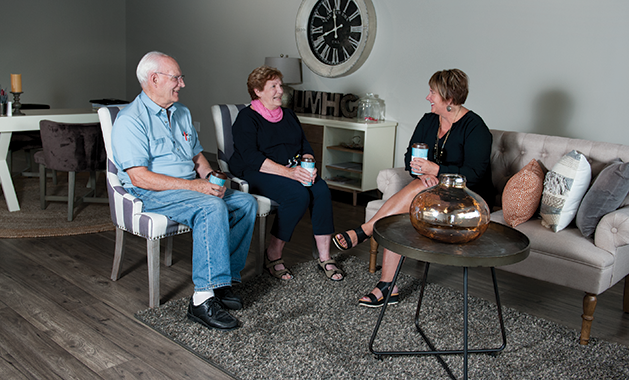
After five years of navigating an often-complicated process to find the best living options for her aging parents and her in-laws, licensed social worker Shelley Anderson decided to live out the adage, “If you want something done right, do it yourself.” In February, Anderson founded Lake Minnetonka Home Care and Senior Living Advising in Mound to help clients find the best fit for loved ones who transition to a new environment to meet their increased needs for care.
Anderson, who is also a certified senior care manager and a volunteer educator for the Alzheimer’s Association, helps clients understand the many factors involved in choosing the right setting for aging parents, in-laws, spouses or others. She asks, for example, “Is the family looking for a modern setting, or for a more homey feel? Are the kids spread out geographically so that a central location is best?” Anderson also helps families with what she jokingly calls the “grunt work:” measuring the dimensions of a client’s current living space and comparing them with the new space to make decisions about furniture and other belongings to move. Anderson also helps families find and use other senior-living resources, including senior-specific moving companies.
One particularly important part of Anderson’s work is helping families decide whether a memory-care facility is the right fit. Anderson describes her mother-in-law’s experience in a nursing home, where she dealt with memory loss and refused assistance with basic daily activities like bathing. Seeing that her mother-in-law’s basic needs weren’t being met, Anderson arranged for her to move to a facility that offered memory care. She knew she had found the right place when her mother-in-law was settled in, comfortable and bathed, within a few hours of arriving. “I want to use what I’ve learned to make it easier for other families to make the best possible decision,” Anderson says.
The research required to learn about senior care options takes lots of time—something busy families don’t often have. Anderson does that groundwork for them and offers them the peace of mind that comes when all options have been carefully reviewed. “I look at what will give the client the best quality of life,” she explains.
“Cost is also a very important factor,” Anderson adds. She reviews financial considerations with each client. Anderson says, “Families are often unaware of financial requirements. For private-paying clients, most nursing homes ask for two to three years’ payment [up front] as a criterion for admission. The average cost of memory care for a client with mild to moderate Alzheimer’s disease could be $4,000 to $8,000 a month, and could cost up to $10,000 a month.” Anderson regularly visits facilities and cultivates relationships with administrators and staff to stay current on availability, as well as any discounts a facility may be offering.
Here in the Twin Cities, the options for senior care are growing: more facilities with different levels of care, different environments, different amenities and so on. It’s easy for families who are starting the process to feel overwhelmed. “My job is to help facilitate what’s often a very confusing, emotional process,” says Anderson.
In addition to offering advising services, on the third Monday morning of every month, Anderson transforms her cozy Mound office into the Memory Café. Along with coffee and breakfast treats, Memory Café provides “a comfortable place for those with early memory loss and their caregivers to connect and visit in a relaxed setting,” says Anderson. Anderson begins each session with a short educational presentation. Caregivers are also welcome to attend solo.








